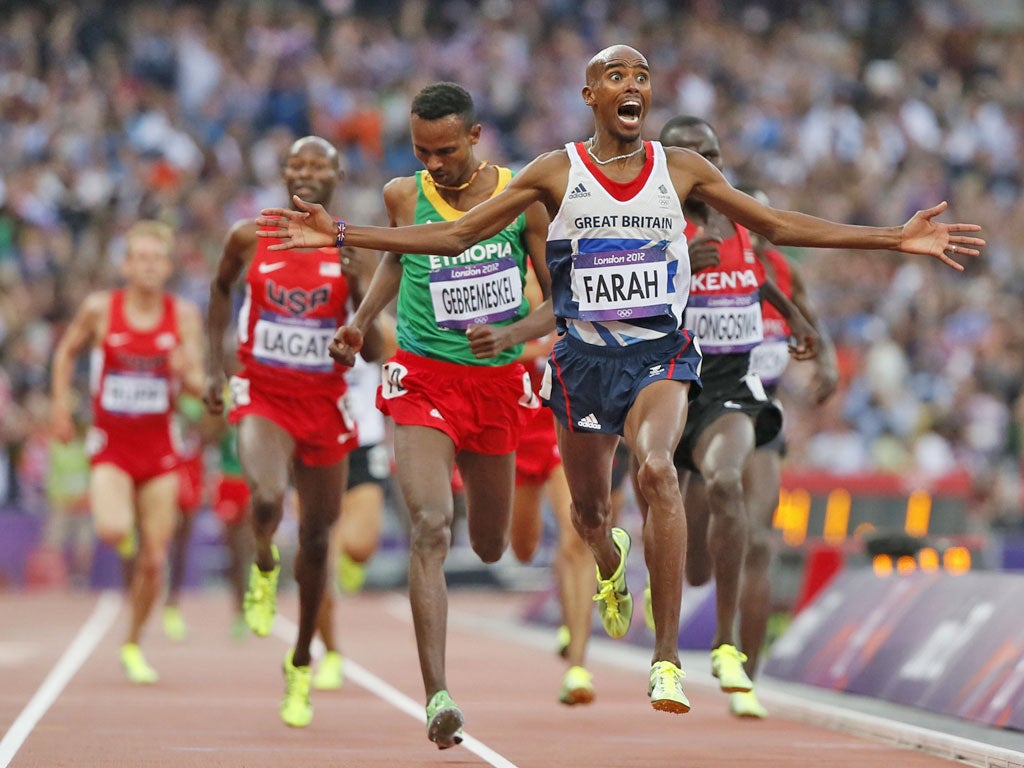Terence Blacker: Trust Branson to make it clear that all sport is really about money
The Way We Live

Surgeries across the country are apparently dealing with a surge in cases of listlessness, low self-worth and non-specific disappointment, caused by the passing of our great summer of sport. Those suffering from what doctors call Post Olympic Depression Syndrome, or PODS, are having difficulty coming to terms with a world in which the British do not win things, where everyday life is neither cheerful nor friendly, and where foreigners no more love us than we love them.
The PODS epidemic is about to get worse. Our Olympic heroes, those wonderful people who reminded the nation of the true meaning of sport, are now making plans for the future, with the help of accountants, managers and marketing experts.
Leading the pack, as one would expect, is our great double-gold winner Mo Farah who is to be the new face of Virgin Media. Unveiling the new frontman, a branding manager announced: "Virgin Media is all about delivering brilliant entertainment, and nobody has got the nation cheering at their TVs more than Mo over the last couple of weeks. Like Mo, we are also obsessed with speed, particularly broadband speed." To make the point, Mo was on hand to pose for the cameras, doing his hands-on-the-head thing while wearing a ginger Bransonesque beard.
There are few sights more guaranteed to dispel Olympic euphoria than that of Mo Farah impersonating Sir Richard Branson. The rest of us may suffer from PODS, but Branson has for some time been a victim of CREEP, Chronic Repetitive Entrepreneurial Ego Problem. No Virgin commercial is complete without some simpering, cult-like reference to, or appearance by, or celebrity imitation of, the great leader.
The effect is oddly lowering. When Usain Bolt was paid to pretend to be Branson in a series of TV ads before the Olympics, and when Farah submits to similar humiliation in the future, a basic, depressing truth is confirmed. In the end, it is not physical achievement or the indomitable human spirit which has the last word in sport; it is money. Donning a Branson beard in return for an eye-watering fee, great athletes are like Hollywood stars dancing on a table at a billionaire's wedding.
We PODS sufferers have tried our best to resist this conclusion. Farah's Branson imitation has not been widely publicised. When Usain Bolt mentioned in an interview that he would not be running in Britain unless there were changes to the way international sports stars are taxed, the subsequent discussions were about revenue questions rather than personal greed. We prefer our heroes to be untainted.
The reverse system applies for public villains. Among media moralists, the cliché of the past fortnight has been to compare our glorious, honourable, sporting Olympians with selfish, foul-mouthed, money-grubbing footballers. It is a criticism which has its roots in a deep social snobbery.
No footballer behaved badly enough on the first weekend of the season to be pilloried in the press, but a top cricketer has shown disloyalty and egotism on a grand scale. Because cricket has not the image problem that football has, we have seen little carping comparison between the virtue of Olympic athletes and the crassness of Kevin Pietersen.
It has become customary to sneer at footballers who, nine months a year, are under pressure and scrutiny from those in charge of their careers – from the press and public – in a way that few, if any, of those appearing at the Olympics have had to experience. They are part of a brutal market, involved in a tough contact sport, criticised and abused if they lose their temper on the pitch, or celebrate in the wrong way, or with the wrong person, on Saturday night. It is absurd to compare that sort of relentless pressure to the task of Olympians, preparing for their big day before a friendly, celebratory crowd once every four years.
Mo Farah's commercial for Virgin should remind us that sport is business, and that it is an illusion to divide its champions into opposing camps – glorious Corinthians who happen to get paid and grubby professionals.
How long can summer loving last?
In August, it can be a tricky business differentiating between news stories included to fill up space and matters of real concern. It seems fairly clear that the item on Radio 4 about the problem of feral chickens in Bermuda was a filler.
On the other hand, a book called The New Rules of Marriage could well last into September, maybe even October. It suggests that the old style of marriage, an amiable muddle of lust, friendship and practicality, is being abandoned by modern couples. Some have no-strings-attached bunk-ups, known as "playfairs". Others develop what are known as "parallel relationships". It is a restless time of the year – sun, holidays, a general shedding of clothes. I shall not be convinced that these new rules are going to catch on until they have lasted through the cold winter months.
Join our commenting forum
Join thought-provoking conversations, follow other Independent readers and see their replies
Comments